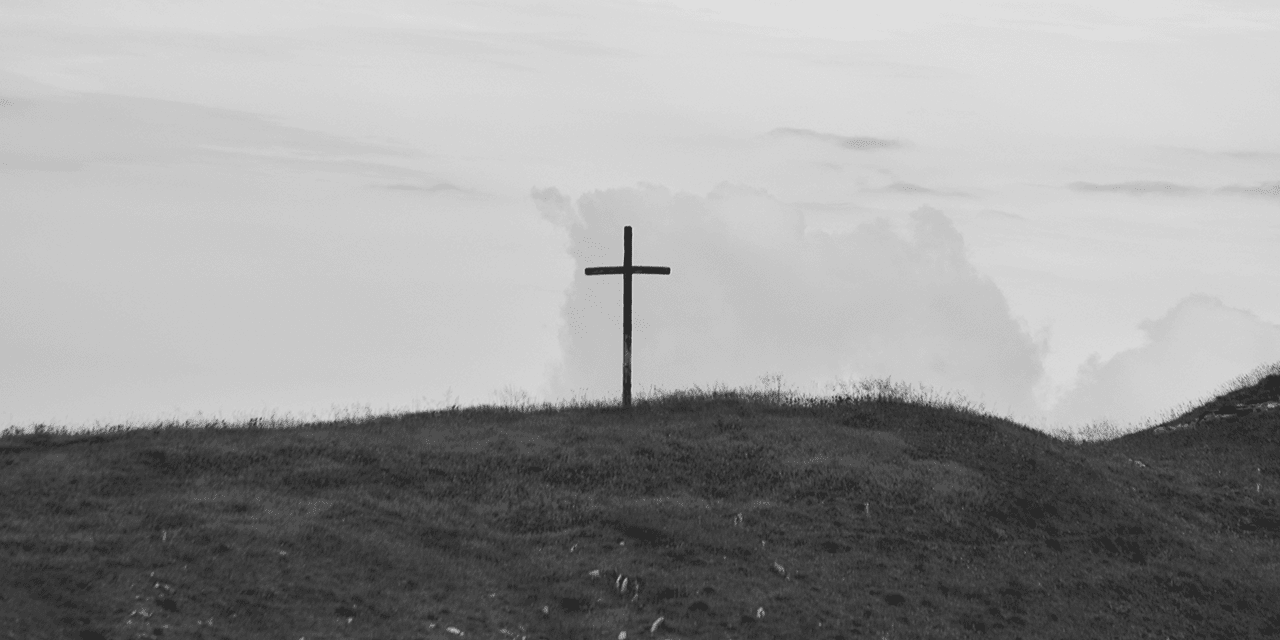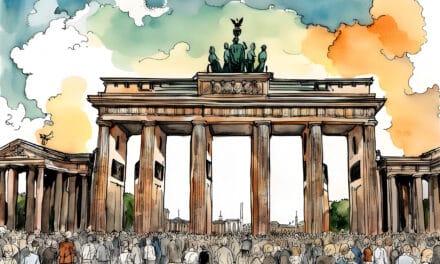What are you thinking? That question at times can be quite unnerving. Sometimes when there has been a long silence between us, whether driving on the road or sitting at home, my wife will often ask me, “What are you thinking?” It’s a question that some-times pulls me up! What am I thinking about really? Should my mind be where it is?
What are you thinking as we worship together in the presence of a holy God? What are you thinking as we pray, or as we listen to God’s Word? That too can be a very searching question! People may look at you, and see on your face, what appears to be a deep and serene devotion to God as you sing the hymns, bow in prayer, and listen intently to the sermon. But it may not be so in your heart. It may be that our thinking is very far from God.
It reminds me of the story in the book The Hammer of God concerning the old peasant farmer Johannes, who was dying and filled with guilt and the dread of coming judgment. The priest tried to comfort him with the goodness of God, but always the poor dying man returned to his unworthiness and sin. During the course of their conversation, Johannes brought up the unworthy thoughts he had had in church,
“I sat in Rave Lunda Church and heard the angels sing. Then I saw my mother in the women’s pew, and I thought: mother has aged, this winter she may die; then I shall inherit the farm. And my heart wept, for I saw that, more than I loved mother, I loved the filthy dollars. Then the pastor came to the pulpit. Potbelly, I thought. You can play cards and fish for trout, but you cannot feed God’s poor little lambs with the Word. But I had not prayed for him. Was that love? Then I saw the captain, he had all the good ground for himself. He is rich in this world, I thought, but he will burn in hell. Was that love. Pastor? And so again he was filled with despair for his sins. Perhaps these thoughts did not weigh heavily upon him at the time, but now as he lay dying, the power of their guilt was great as he entered the valley of the shadow of death.”1Bo Giertz, The Hammer of God (Augsburg Books, 2005), 15-16
Luke 22:24-46 brings us face to face with the thoughts of those closest to Jesus, at the most solemn time and place in His life. And what are they thinking about? As Jesus, filled as He was with deep spiritual earnestness, inaugurated His last supper on the eve of His terrible sufferings, His disciples were thinking of themselves, and their own ambitions for power and glory. In fact, in this most holy and solemn moment in the upper room, Luke tells us (and he is the only one to do so) that they are in fact contending with each other over who will be the greatest in the kingdom of God.
They are thinking only in terms of their own worthiness, and entitlement. Leon Morris comments: “It is sad that, with Jesus so close to the Cross, His most intimate disciples were so far from His spirit.” How sad indeed! Especially when we include the additional information that John supplies in his gospel, of the fact that it was in this upper room that Jesus had risen from supper, knelt down and had washed the disciples’ feet. What a contrast to the attitude of His disciples! It was and is a contrast so stark as that between darkness and light. Hence we have here the Story of the Cross in Black and White! What a contrast between the self-giving humility and love of Jesus, and the disciples’ display of terrible pride and rank self-seeking. These disciples are like some of the Christians in the Corinthian Church whom Paul addressed in his letter in chapter 3,“And I, brethren, could not speak to you as to spiritual people, but as people of the flesh, as infants in Christ… for you are still of the flesh. For while there is jealousy and strife among you, are you not of the flesh, and behaving only in a human way?” (1 Corinthians 3:1-3).
The contrast between Jesus and the disciples does not end here. It carries on throughout this section of Luke. We see Peter completely oblivious to the spiritual battle going on around him, and totally blind to his own flawed moral character. In contrast we see Jesus, all too aware of the reality of the spiritual battle and the “powers of darkness, mustering their unseen array.” He prays for all His disciples, but especially Peter, who as yet, sees no need for such prayer. Little does he know how far he would fall. Again, in the garden, the contrast continues. Jesus enters here into His most poignant and agonizing suffering, so great that Luke alone records the fact of an angel strengthening Him in prayer while he sweat great drops of blood. Yet His disciples, in the hour of His greatest need, are asleep. Overwhelmed with the depth of spiritual oppression and grief of this night of all nights, they succumb at the same time to spiritual sloth. Urged to pray, lest they fall into temptation, their human weakness prevails, and the exhortation to prayer falls upon their deaf, slumbering ears.
What a sad and pitiful picture of Jesus’ most intimate disciples! And yet, these are the very men out of which He will build His Church on earth. These are the very men He has chosen to sit upon twelve thrones judging the tribes of Israel. What amazing grace!
I wonder, do we see ourselves in these disciples? Do we see ourselves in Johannes? Are we any better than they, or him? Does not this ‘Story of the Cross in black and white’ act as a mirror this morning? A mirror in which we see ourselves. And yet God in His wondrous grace has chosen us to be His disciples too, though so unable and unworthy in ourselves.
We must understand that these disciples, at this stage, had no real understanding of the Cross. They had not yet passed through the terrible events that lay ahead of them. They had not yet, we could say, passed through the Cross. They as yet did not know its Power – its killing power to deal with all their sin, and all their pretended self-centred pride.
They had, I suggest, little to no understanding of the significance of that Last Supper.
Did they fully comprehend that He would be the Passover Lamb that would be slain for them? Did they understand the full significance of His words: “This is My body which is given for you.” “This cup is the new covenant in My blood, which is shed for you.”
Did they know that these words pointed to His death for them, and for all men, and that as their suffering servant and saviour, He would pour out His soul to death… and bear the sins of many, as a substitute in their place?
Did these disciples as yet, comprehend the meaning of His agony in the Garden of Gethsemane? I think not! Why was Jesus in such agony, when many others, including those in future times inspired by His sufferings, faced death calmly. Surely this was no ordinary agony of dread. For He was to be numbered with the transgressors, a direct quote from Isaiah 53, where the suffering servant suffers and dies in the place of sinners. Jesus was going to the Cross to bear the cup of God’s holy wrath upon sin. He would die that death which we deserve, in which He would be forsaken by God. He would die the death in which God made Him to be sin for us. (2 Corinthians 5:21).
My friends, it was only through the holy sufferings, and death of Jesus that transformed these men’s lives. It was not the teachings of Jesus, as profound and important as they were and are, that brought Israel to repentance. And it was not all the instruction that Jesus gave to His disciples prior to His death that changed these men into humble ministers of the Servant King as described in verses 25 & 26 of this chapter. No! It was the Cross that changed them; that converted them; that humbled them; stopped their boasting; killed their pride and brought them to repentance. And it is and will be the same for all of us.
Paul could write how the ‘Word of the Cross’ though foolishness to those who are perishing, is the power of God to them who are being saved. Prior to the work of the Cross, these men, as depicted here were in fact far from Christ’s mind, heart and Spirit. They had as yet not experienced the death-dealing power of the Cross. On the other side of the Cross however, we see these men humbled, contrite, prayerful, and ready and willing to lay down their lives for others, and to pray like Stephen for the forgiveness of their persecutors (see Acts 7:60).
In 1 John 4:7ff., we are reminded that the love which is of God and is born in us by the Holy Spirit comes to us through the work of the Cross. It is in the light of the Cross that we see the wonder of God’s amazing love sending His Son to die for us. It is in the light of the Cross that we see our sin in its true colours as Christ bears their judgment. And it is in the light of the Cross we see the gracious provision of full and complete forgiveness and cleansing for all our sin. And in this light, the light of Calvary, that we are brought to repentance and to that faith which works by love.
How then is this power of the Cross exhibited before us in Luke’s account of these disciples on the eve of Christ’s death? I think we see the effect of that work of Calvary in the fact that Luke does not gloss over their sins. The pride of our flesh and of the old Adam would surely want to cover over and hide one’s cowardice, one’s pathetic moral weakness under stress, one’s appalling pride and self-glorying. The Cross reveals our sin, and at the same time atones for it, and redeems us into the Father’s loving and forgiving embrace. Once, like these disciples, we have known and experienced the saving power of Christ’s Cross, releasing us from all guilt, we no longer have to cover up, wear a pious mask, or live in the illusion of our own self-righteousness. We no longer have to try and be other than who we are.
We can have the freedom to be, like these disciples who were willing for all the world to know their true character apart from Christ – a sinner saved by grace. Years later, these disciples in effect could say, “See here in this text. This is who I was, and this is who I am apart from Christ. But Christ loved me and gave Himself for me, and now I am His new creation. Fully forgiven and transformed by His grace. I have been crucified with Christ… It is no longer I, the old Adam, who lives, but Christ who lives in me.
This is how I know that you too have passed through the Cross. You are not ashamed to acknowledge your sin and confess it. You are not ashamed to admit that in you, that is in your flesh is no good thing. And that is why the Cross of Christ means so much to you.
You know why Christ died for you, because you know how much you needed that cross, and still need it today.
Another thing we see here is the reminder of the way the Cross of suffering is needful for our sanctification. The Cross indeed saves us once and for all. (Romans 5:1). But it also goes on saving us, as we experience it in our trials and tribulations, shaping us into the people God wants us to be. The Cross not only saves us, but it shapes our lives. The Cross is not only the foundation of our salvation (Justification), but also its formation (Sanctification). We are to deny ourselves and take up our cross daily and follow Him.
Do we not see this here in Luke. There is no passing over the fact of suffering for Christ in this world (see verse 28; 36). Furthermore, the temptation and trial of Satan is needed for our growth to maturity. See verse 31(note that the ‘you’ is plural). Satan obtained you by asking – procured your being surrendered to him, as in the case of Job. There is the clear thought that the request has been granted. Why? It would follow that the trials and testings that come to God’s people are only those which He allows. And why does He allow them? So that, like in Peter’s case, we may turn again and strengthen His brethren. In other words, become more deeply repentant, and more profoundly useful in the Master’s kingdom.
I picked up a book while on holidays recently in NSW. I would like to finish with a quotation from the preface to it:
“From the moment of our baptism into the death of Jesus, we begin the practice of dying by degrees – dying to self and to our self-centred pursuits of anything that wars against our vocation as disciples. We begin the long, sanctifying process of taking up our crosses each day, seeking to crucify those parts of our hearts that yet cry Me! and Mine!, and surrendering piece-by-piece those territories of our souls we had so long claimed as our own, now submitting them instead to the lordship of Christ.”2Douglas McKelvey, Every Moment Holy (Rabbit Room Press, 2017)
- 1Bo Giertz, The Hammer of God (Augsburg Books, 2005), 15-16
- 2Douglas McKelvey, Every Moment Holy (Rabbit Room Press, 2017)





